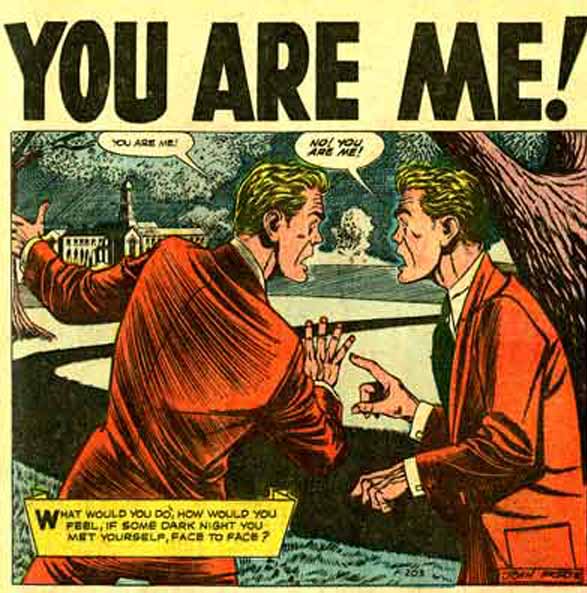The shadow makes itself known through projection  onto other people or eruption into your behavior.
onto other people or eruption into your behavior.  These can be dangerous, but are not necessarily so, which is why I hesitate to label the shadow negative as is common today.
These can be dangerous, but are not necessarily so, which is why I hesitate to label the shadow negative as is common today.
How the shadow becomes negative is complicated. I describe archetypes as all imaginable experiences. You, as an individual, can live out only certain of those experiences/archetypes. The ones that you do not live out go into your shadow. They are defined as “not you.” But because you are human, you may equate those that are “not you” with those that are “not human.” The shadow is the source of beliefs such as “I am not X; therefore, no human should be X,” “being X is not good (for me); therefore, being X is not good (for anyone).” The shadow is also the part that says “I do not imagine myself as X; therefore, I must fight vehemently never to become X or let myself be seen as X.”  We will see later how those patterns live out.
We will see later how those patterns live out.
The shadow erupts into your life when it has been repressed so strongly for so long that the only way it can make itself known is in a forceful display. One of the best examples I can remember is the anti-gay senator who was caught soliciting gay sex in an airport bathroom. He was so worried about being gay that he outwardly acted like he was anti-gay. The shadow is what chose a very public place and way for him to try to solicit gay sex. His gayness needed to come out, and if he wouldn’t see it, the shadow would make sure he had to see it (as did everyone else). Hitler, for example, was so afraid people would find out that his ancestor was Jewish that he committed genocide against them to prove his non-Jewishness.
How the shadow gets projected onto others is also after being repressed so strongly for so long. In projection, it’s as if a movie playing in the shadow of your mind thinks “I need a big screen on which to project this so I am seen.” Even schoolchildren know this pattern, with the cliched schoolyard comebacks, “Takes one to know one”  and “I know you are but what am I?” So, in the previous example, the senator denying his own homosexuality projected out onto other gays that they were “bad.” A politician who does not feel secure in his ability to lead, will accuse anyone who says he may not be a good leader of being “a traitor.” They have, in fact, merely voiced his own inner insecurity.
and “I know you are but what am I?” So, in the previous example, the senator denying his own homosexuality projected out onto other gays that they were “bad.” A politician who does not feel secure in his ability to lead, will accuse anyone who says he may not be a good leader of being “a traitor.” They have, in fact, merely voiced his own inner insecurity. 